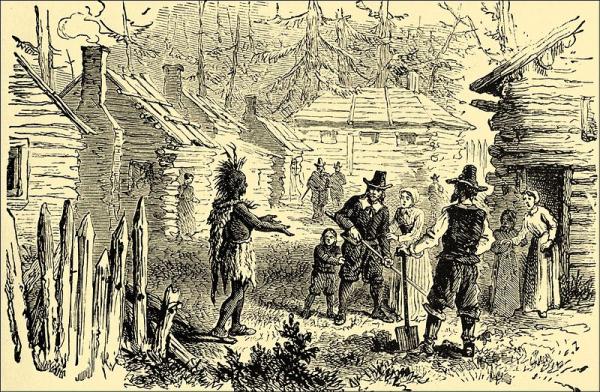by Edgar B. Herwick III

Samoset speaks English to the British colonist
By the 1830s, almost all of the large hardwood trees in Massachusetts had been cut down.Jesse "Little Doe" Baird, vice chair of the Mashpee Wampanoag tribe explains that this was a huge problem for the growing state.
“The local economies depended on cash and needed a product to bring in that cash. And that product - at the time - was fuel and the fuel was wood.”
One of the few places in the state that still had virgin hard wood was the land set aside for the Mashpee Indians.
The tribe generally did not have a cash economy so it’s not like they were trying to cut wood produce wood and sell wood for cash, they made a living off the land itself.
For years, white men had been encroaching on the Mashpee’s land, cutting – and taking their wood. And for years, the Mashpee had been writing to Massachusetts officials about this – and a host of other issues - usually in their native language.
"One of the problems obviously is that generally people are not going to be able to read or understand that language," Baird said. "But even if they could you have a group of people asking the group people that are responsible for their condition to fix their condition."
And so, the Mashpee decided it was time to fix it themselves. Enter William Apess, a Pequot Indian – and an ordained Methodist minister. He’d heard about the struggles in Mashpee and had a notion that he could help.
"He had a different approach in terms of how to speak to the white man of the day," Mashpee Wampanoag tribal historic preservation officer Romana Peters said.
Peters pointed out that Apess had the ear of white men and high places, and had the political acumen to present the Mashpee’s case in terms that officials couldn’t ignore.
"Things like we shared a desire for liberty, we fought together during the Revolutionary war both wanting liberty and freedom and that’s no less than Mashpee Indians are asking for now," Peters said.
And so a tribal council was convened on May 21, 1833. Apes and the Mashpee leaders drew up a document that has come to be known by some as the Mashpee Indian Declaration of Independence. Not only did the Mashpee declare the right to govern themselves, they also drew a line in the sand. As of July 1, outsiders would no longer be permitted to cut wood on their land.
Predictably, when July 1 came, so did the white men. Despite the warnings, two men from Barnstable piled up their horse drawn cart with freshly cut virgin hard wood. That’s when they were met by six Mashpee – including Apess – who proved to be as good as their word.
"The cart was dumped over, they said, ‘You’re not going to take the wood,' and so the wood was dumped out and the men left with their cart."
As a result, the six Mashpee men were arrested. But the “wood riot” - as it came to be known – proved to be a turning point. It garnered much attention in the press and finally opened up a dialogue with Massachusetts’ officials that eventually earned the Mashpee an unprecedented level of control over their own land - and governance.
"It definitely was a huge step in the right direction for people to be able to practice self-determination and not be under a different set of laws simply because of the color of their skin and their different life-style," Peters said.
Peters points out, it’s a path of self-determination that the Mashpee - and other tribes – are still carving out - even today.
"Each President issues a new policy on how to treat American Indians. Sometimes it’s been assimilation; sometimes it’s been extermination. Right now, since the Clinton administration, tribes across the country have been deemed sovereign nations, so you see the evolution of this and people being more ready to be sovereign once again."
The Mashpee Declaration of Independence, drafted and signed 181 years ago this week.

No comments:
Post a Comment